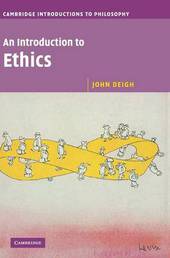
|
An Introduction to Ethics
Hardback
Main Details
| Title |
An Introduction to Ethics
|
| Authors and Contributors |
By (author) John Deigh
|
| Series | Cambridge Introductions to Philosophy |
|---|
| Physical Properties |
| Format:Hardback | | Pages:254 | | Dimensions(mm): Height 266,Width 180 |
|
| Category/Genre | Ethics and moral philosophy |
|---|
| ISBN/Barcode |
9780521772464
|
| Classifications | Dewey:170 |
|---|
| Audience | | Professional & Vocational | | Tertiary Education (US: College) | |
|---|
| Illustrations |
1 Line drawings, unspecified
|
|
Publishing Details |
| Publisher |
Cambridge University Press
|
| Imprint |
Cambridge University Press
|
| Publication Date |
4 March 2010 |
| Publication Country |
United Kingdom
|
Description
This book examines the central questions of ethics through a study of theories of right and wrong that are found in the great ethical works of Western philosophy. It focuses on theories that continue to have a significant presence in the field. The core chapters cover egoism, the eudaimonism of Plato and Aristotle, act and rule utilitarianism, modern natural law theory, Kant's moral theory, and existentialist ethics. Readers will be introduced not only to the main ideas of each theory but to contemporary developments and defenses of those ideas. A final chapter takes up topics in meta-ethics and moral psychology. The discussions throughout draw the reader into philosophical inquiry through argument and criticism that illuminate the profundity of the questions under examination. Students will find this book to be a very helpful guide to how philosophical inquiry is undertaken as well as to what the major theories in ethics hold.
Author Biography
John Deigh is Professor of Philosophy and Law at the University of Texas at Austin. He is the author of The Sources of Moral Agency (Cambridge, 1996) and of Emotions, Values, and the Law (2008).
Reviews'This is a beautifully and elegantly written introduction to the fundamental questions of ethics. It is a comprehensive and accessible book that will be of interest to students and also to anyone reflecting about how to live a good and normatively defensible life. Highly recommended.' John Fischer, University of California, Riverside
|